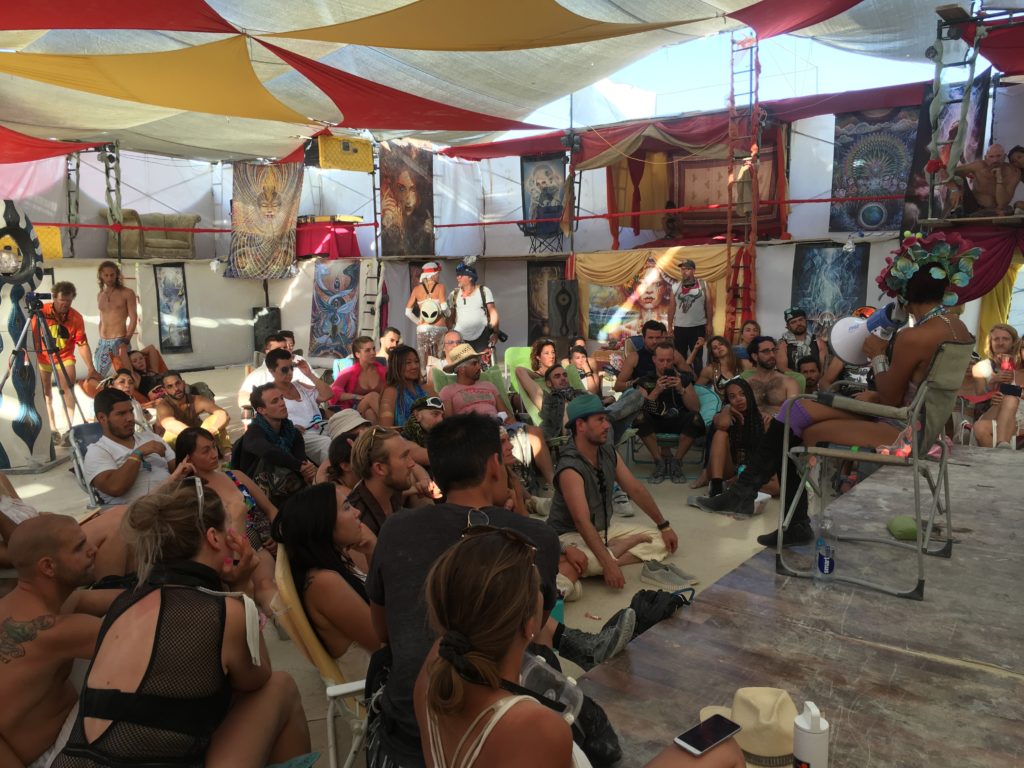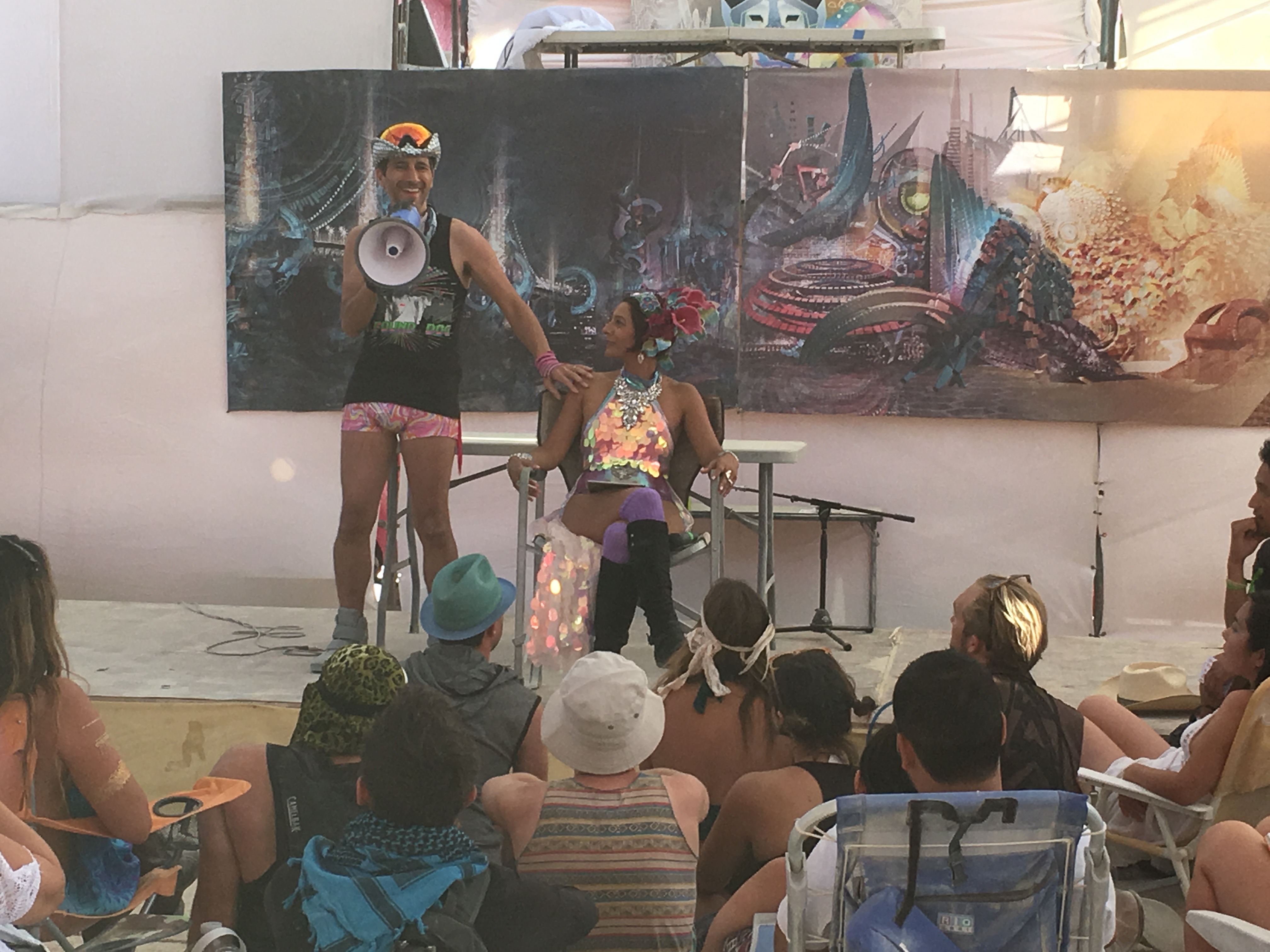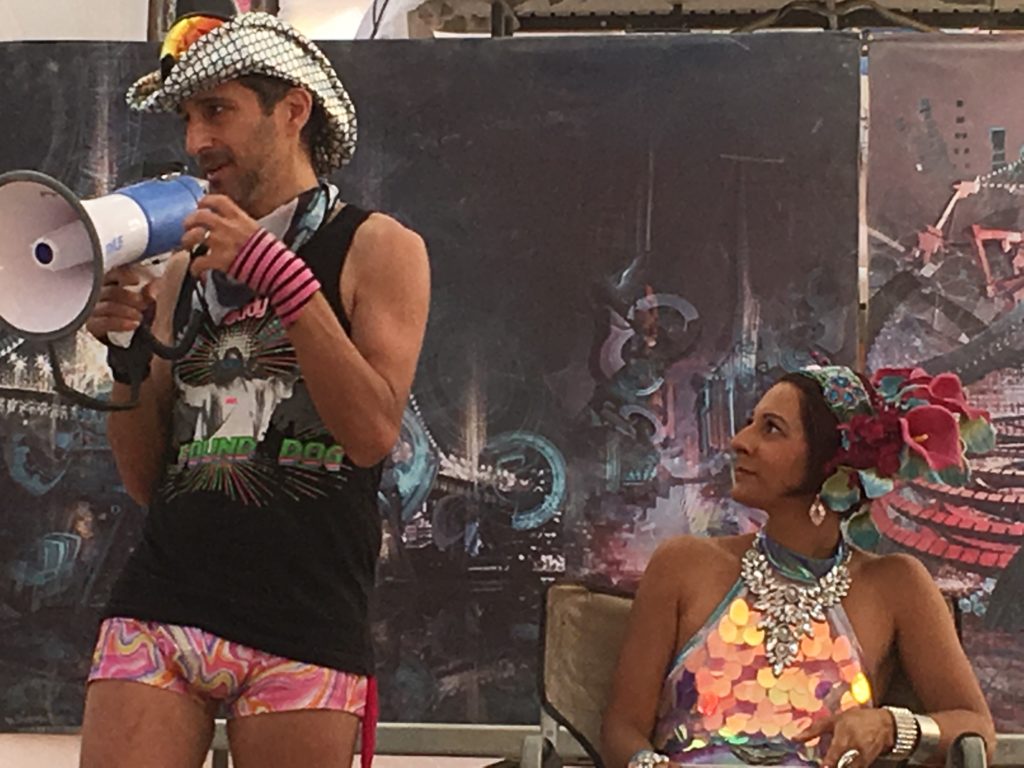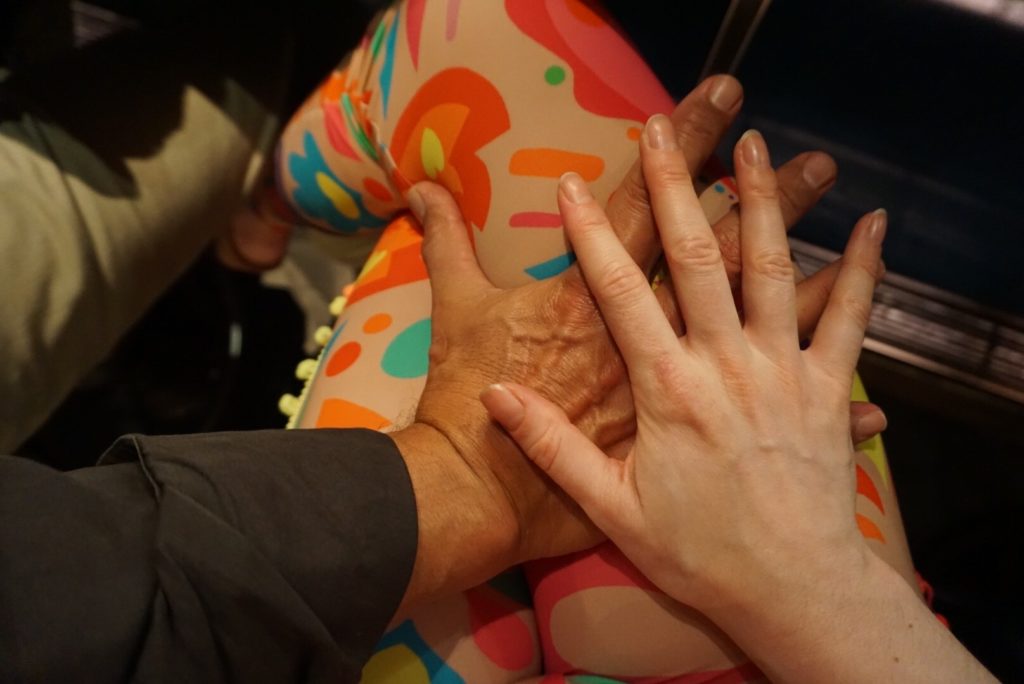
Annie Lalla, Love Coach, speaking to a sea of spellbound love-seekers at Burning Man. August 2018
To listen to this episode, click the sassy redhead on the peach background, and become a patron of the horizontal arts…
Annie: He probably wants you to feel loved, but the work it would take for him to be the version of him that would make you feel loved, is an Everest climb for him in personal development. […] People don’t realize that going into relationship is actually entering a crucible of self-actualization. It’s not, Okay, now you love me I love you let’s just relax. (Lila cracks up) When people finally fall in love, […] my clients a lot of my single clients are just like, “Oh my God, if I could just find love and find my partner” and, when they finally find their partner and they’re gonna get married I’m like, “Oh, girlfriend, now the work starts. This is where it actually gets interesting.”
Lila: Actualization is my word of the year for myself. […] It’s the word I’ve chosen. I don’t do resolutions; I choose a word. […]
Annie: Well, if you have any questions about that; I actually think that’s the point of being in relationship. Is to optimize opportunities for actualization. One of the frames I have is: your partner is a mirror, a shiny mirror, for all your magnificence. And all your shadow. And you can get mad at the mirror, but it’s offering a service of education. […] And the shinier you can be as a mirror for your partner, without putting your stuff onto it, the more transformational opportunity they have, if they’re willing to look at the reflection. And so when I get my husband complaining about something, what I get is: Half of this is his crazy, and his wound, and half of this is him showing me something I can’t see about myself. That if I were to take on, would upgrade who I am. As a wife as a mother as a woman. And so I could look at the part that’s his crazy, but that’s a waste of my time! It’s much more interesting and useful for me to dig through all his wound-grumble, and look for the golden nugget of truth, of reflection, the gift in what he’s saying— obviously, I’m trying to train him to have better bedside manner in how he offers this complaint. I mean, a complaint is a: I love you; I know you can do better than this. But very few of us complain in that way. Very few of us say, “Hey look. I love you. I believe in you. I think you’re extraordinary. And I know if you put your mind to it, you could get this podcast launched; you could get this book written, and I believe in you, let’s do it!” No, they go, “What the fuck is wrong with you? You’ve been sitting here for five— years, you haven’t done anything, and the complaint the complaint.” But the truth is, we know that they can do better. And I think if you can phrase your complaints as: “I love you I know you can do better. And I’m gonna help you.” That would work much more to get the behavior change, than the grumble. Which just erodes further their already-depleted self-esteem.
Lila: This unearths the request, right, underneath the complaint.
Annie: Yeah. There’s always a request. And there’s a request that usually improves and increases the actualization of both partners. But that takes some intentionality.
Hello my dear patrons!
I’m back in New York, where it is snowing and hailing and blustering and I’m running around Manhattan in galactically-shiny snowsuits.

Annie Lalla, in her Goddess raiment.
This episode is the continuation of my juicy dialogue with Annie Lalla, world-class Love Coach. I usually dislike the word Coach. (And the word juicy, for that matter. But they are both apropos here.) So many people calling themselves coaches these days. What are their credentials? How can we trust them? But Annie?
Annie is a True Coach. A practitioner, a mirror, a cheerleader, a pioneer, a walk-her-talk-er, a break-it-down-er, a thought leader, a metaphor-wielding, algorithm-developing, Gladiator for True Love. She is a Coach I would hire.
In this part of our conversation, we discuss linking tears to sacred moments of aliveness, saudades, our loveprint, translating smuggled I love yous, learning to resolve a conflict in cognitive order: from lizard brain to monkey brain to human brain, fighting in front of your kids, the desire behind every relationship conflict, partnership as a crucible of self-actualization, how we disassociate during sexual experiences, and the ways we bring ourselves back, loving our defense mechanisms into submission, how Annie met her soulmate, and just a little bit about Mister Miami.
If you have any questions or ideas or burning thoughts, you can always reach out to me through Instagram, or Facebook. I love hearing what the episodes evoke in you. I’m grateful when you share. You are my early adopters, my champions, my focus group, my Intimacy Warriors.
If you are in need of the services of a Love Coach (and really, who isn’t?) you can commune with all things Annie through annielalla.com
Come lie down with us again in Miami, Florida.

horizontal with Annie Lalla in a big white bed overlooking the ocean in Miami, FL. January 2019
Links to Things:
Become a patron of the horizontal arts for access to ALL the episodes!
The website of a bonafide Love Coach, Annie Lalla
Show Notes (feel free to share quotes/resources on social media, and please link to this website or my Patreon!):
website link: https://horizontalwithlila.com/
Patreon link: https://www.patreon.com/horizontalwithlila
[3:31] Annie on translating tears as sacred moments of aliveness.
Annie: It takes courage to be transparent. It takes courage, to be honest. It takes courage to cry. And I feel like someone who’s actually connected to their aliveness, lives one thought away from tears at all times.
[…]
Lila: I remember saying to somebody, I don’t know, like, if I really really really cried […] I don’t know if I could ever cry it all out, and I probably couldn’t because, the world is heartbreaking, in all kinds of ways.
Annie: And we have so many pent-up uncried tears from our childhood […] that when they come, just let them come. You know, a lot of my clients think that they’re weak, or they’re embarrassed when they cry and— literally, when I think of a woman crying, I think of like a heroine on the top, on the front of a Russian novel, and she’s crying for something so intricate, exquisite, and emotionally beautiful, that it’s a glory. I never see tears as an aberration from the social norm. I see it as like, finally, we’re seeing the raw aliveness of the human condition. […] And if you are in the raw aliveness of the human condition, tears is the only response. And, (overlapping) could be happiness—
Lila: (laughing through tears, overlapping) If you are paying attention, yes!
Annie: — happiness or sadness or fear. A sunset moves you to tears because you’re in your raw aliveness, and so if people could link tears — in themselves and others — to an exquisite, sacred moment of aliveness, such that they could be proud of it, I think we’d live in a different world. And I would love for our culture to herald — especially with men — Tears: does not mean you’re weak. It takes way more courage to feel those tears coming up in your throat … and to either cry or to lie. And, most of us lie. That’s not courageous; that’s not masculine heroism. To me, a man who can be transparent about his emotion, is way more masculine, way more tough, than the guy in the bar who punches his shoulder, says, “Hahaha.”
Lila: Because it’s against the social contract, right, it’s against the social norms, and so you have to have incredible bravery and confidence to go there, or you have to be just completely overcome, right? Like, it’s cry or die.
Annie: And it’s unfortunate that— we, we’re both trying to work on that, you know, in our own little ways, of changing the social norms […] around tears, especially in a man, but in anyone, being a triumphant moment of human-ing […] rather than a mistake. Or something to apologize—
[6:14] Who taught Annie about these triumphant moments of human-ing?
Annie: My father is that one that taught me to cry at beauty. I saw him cry at poetic, poignant moments between him and another person, or . . . . . (Annie chokes up) I mean, my father would cry holding my feet, because he was so overwhelmed with, joy, (Lila whimpers softly, Annie speaking through tears) he would describe breathing in my breath, when I was like, six months old, and inhaling my exhale, like it was a, a gift… and so I learned that tears mean Yay! instead of Nay, and the things my father would cry at were the kinds of things I would want to write in poetry. And so I think my imprint for tears is, um, romantic, and the poetic, and the exquisite, and then I also learned that tears can mean you’re scared or you’re sad or you’re angry. But they still hold romance and poetry for me. […] Even in those other feeling-states. But, I think I learned from my father that tears are, something to be really proud of, and he was never, he never hid them. He was always transparent about them. And, he felt proud of them, and I think, having a man in your life, display tears with pride is just something I was—
Lila: Wow.
Annie: — lucky to experience.
Lila: Wow. Yeah, wow, I don’t think I’ve— wow, have I ever seen my father cry, I don’t think, I don’t— … Dewy-eyed. But I, I can’t recall tears.
[7:59] Lila on her Brazilian people, and their great regard for saudades.
Lila: Brazilians have a great regard for […] the melancholy […] of longing, and missing someone, and, and I have enjoyed ….. access to my melancholy.
Annie: Melancholy— even the word, I don’t know what you mean by it, but for me it has a bittersweet—
Lila: Yes!
Annie: — taste. It’s sad, but it’s—
Lila: Beautiful.
Annie: — alive and beautiful and poetic and— to be in melancholy, I mean, this is what the artist, you know, the troubled artist lives from this, My melancholy feeds my creativity…
Lila: I used to feel that way.
Annie: And, it does, and I think you can also feed your creativity from—
Lila: Another place!
Annie: — ecstasy too! […] It’s great to have range; I’m a big fan of range. So I want you to be able to cry at a moment of poetry and jump up and down on a subway platform… […] And roar your howl of rage and, play the full human spectrum.

Lila rewiring her nervous system for joy by celebrating 1 year of horizontal with a Confetti Project photo shoot. June 2018
[8:57] Lila on her Happy Dance and rewiring her nervous system.
Lila: I’ve been, what I call “rewiring my nervous system for joy.” By, choosing to celebrate… any little successes, like any, every time I get a new patron, and, just any little buoyant fact of my life by physicalizing it, and I have a Happy Dance, that I do—
Annie: Yesss!
Lila: And, wherever I am, when I know that I get a new patron, I do it. If I’m in— that’s my rule, it’s like, wherever I am— so, sometimes I’m on the subway, and sometimes I’m in bed, sometimes I’m in the tea shop—
Annie: Yeah!
Lila: — sometimes it’s right before I’m teaching yoga class and I’m just over here, like, movin’ my hiiips, and it’s really elaborate—
Annie: Excellent…
Lila: — it takes like 15 seconds to accomplish, so that I really start to feel it, so it starts over here with the arms overhead pumping—
Annie: I love it!
Lila: — the fists overhead and the hips going from side to side, then it goes down, and I’m like, “Yeah!” and the hips are still going and, and then, there’s— dance, like dance dance revolution—
Annie: And that’s probably like doing reps!
Lila: — and then it goes back up, and I turn my head, to one side, and I turn the fists around sort of like (Annie laughs) like a, like the gun show, where you’re showing, like the muscle—
Annie: Yehhhh.
Lila: — muscle competitions, and I turn my head the one way, and I turn my head the other way, and that, that’s the (underlapping) completion of the Happy Dance.
[10:11] Annie on a self-esteem-generating noticing practice she teaching her clients.
Annie: (overlapping) Yeah, you’re anchoring it! I mean, literally what you’re talking about is how I teach clients to generate self-esteem. I send them on a reconnaissance mission in their current life, to look for microscopic moments of delight, poetry, gratitude, or pleasure. (Lila mm’s) Anything. It could be literally like, you walk in from the cold to a store, and and the heat hits your neck. Or your feet touch the bathmat after you get out of a shower, and it feels all warm and fuzzy, or literally, turning your pillow over in the middle of the night, to get the cold side! These microscopic moments of delight are happening all the time, and we’re not tracking them. And so, literally I’m trying to train you, brainwash you into, noticing how you are in love with your life, in moments that you’re missing, and then, string them together like a bead necklace, and wear it, and basically become, on the lookout, for these micro delights. Because your life is made up of these moments.
Lila: Detective of Delight. If they can’t access it as delight or pleasure, do you ever ask them to look for relief?
Annie: Yeah, that’s a, a brilliant— sometimes I think of it as gratitude. But I love the idea of just even relief, or the relaxation—
Lila: Even relief.
Annie: — of the nervous system.
Lila: I got off the subway. Ahh.
Annie: Or, I had to pee, and I got to the toilet on time. Ahh.
Lila: (laughs) Ahh! That feels so good!
Annie: Yeah I love that, relief, but um. Any moment where your aliveness just got better. And so what we’re doing is we’re helping you train you to fall in love with your life, as this sneaky way to help you fall in love with yourself.
Lila: Yes.
[11:43] Annie on a path to self-love.
Annie: Because it seems to be easier for people to fall in— you were talking about self-love earlier. You can’t go directly to self-love. You have to notice a moment. That you liked. In your life! And then another, and then another. And then you become better at noticing the moments that you love in your life, and then you fall in love with your life, and then you fall in love with yourself, and by the way, if you want a man to fall in love with you, you have to already love your life. Because he doesn’t want to hitch his life up to one that doesn’t look very interesting to the insider.
Lila: And moments in which you are feeling yourself as the kids say these days, right, you’re like, Mmmmm. Meee. (giggles) When I have a really good outfit on, I look in the mirror before I leave the house, I’m like Yyyeaaah, ya do! (giggles)
Annie: Yes!
Lila: Yes you are; You are looking fabulous!
Annie: And now I had another layer for that, that makes it generative. So, I want the person to notice their own moment of delight, beauty, glamour, exquisite— like, say you say something really beautiful to another person in a conversation and it, shifted their mood. So notice that you just did that, but then I want another part of you noticing that you noticed it.
Lila: Mm. Yeah.
Annie: So there’s like, you looked in the mirror and you’re like, “Yeah, I look so good,” […] and then you imagine a a version of Lila in the corner, watching—
Lila: Good job noticing that, girl.
Annie: Yes. So you’re clapping for the moment of noticing, by another part of you, and if you could install that second-order attention, it runs on autopilot in your psyche, and you have a self-esteem engine installed, running 24/7. That’s the trick.
feeling yourself aka feelin’ myself (verb) = the act of noticing one’s own foxiness and glory (current, colloquial)
[13:13] Lila on her former yoga teacher, who used to say “Notice what you notice. Now notice the one who is noticing.”
[13:57] Annie on noticing.
Annie: Notice what you’re noticing? I love what I notice! […] If I could sell tickets, in here, (Lila laughs) to have the fuckin’ world see what I notice? It’s so fucking good in here! And I think you feel the same way. I think you’re like, “The shit I notice, man!”

Goddess of True Love.
Lila: Oh my Gosh!
Annie: “It’s, delightful.”
Lila: I pattern-match all over the world, I frame things… yes!
Annie: And I feel like you’re scouring for magnificent moments of reality— and this is a skill, this is a muscle you have to build. And, I fall in love with what people notice! (Lila mm’s) And that’s— when you’re looking for a romantic partner, whether they’re aware of it or not, they watch what you notice: in others, in the world, and in yourself. And they fall in love with how and what you notice. So if you could cultivate your noticing to be the kind of thing you would put on your business card […] and be proud of it, basically you’re bringing intentionality to your attention, which is the most—
Lila: This is how I frame the world. This is the quality of my attention and how it acts on the world.
Annie: And that I’m proud of how I spend my attention. ‘Cause you can spend your money and your time in all kinds of ways, but the highest commodity you have is your attention. How you spend it: says everything about who you are. So spend it in a way, that if everyone could see the behind-the-scenes and read the index, you’d be proud.
[15:31] Annie’s thesis topic in college: Whether you fall in love with a person or a set of characteristics.
[16:31] How Annie’s fascination with relationships was evident from a very young age.
Annie: In the schoolyard, I was the one that everyone came to, to resolve conflict between girls, issues around boys, I just was the person, that somehow knew— I think I, I had this belief, that I still have, that any two seemingly disparate systems, have some overlap, or some shared reality, and from there we can transcend the conflict. Even the most seemingly opposite enemies— there’s some bit of reality I can get them to agree upon, and there I would start. And we could build a relationship from that. […] And so there was no conflict that couldn’t be transcended, given this belief. And I just believe that human beings, on some deep level, wanna be connected more than they wanna be disconnected.
Lila: Do you know where that came from? Did you see your parents resolve conflict?
Annie: I— yeah. I mean, my parents deeply loved each other. They fought a lot. They were like catty old, bitching all the time. But I could always see that they loved each other, again, more than they had the grumbles. And, they would resolve conflict. Imparticular, in front of us.
[17:39] Annie on fighting in front of your kids.
Annie: And I think, there’s this thing around parenting that you shouldn’t fight in front of your kids and— as a mother right now, I actually think: It’s very important to fight in front of your kids.
Lila: Yeah.
Annie: And let them see you resolve it. […] And do something that we’ve built in— we learned from one of our teachers, which is, when you’re having the conflict in front of the child, you make sure you look at the child, and you say, “Listen, hun. Mommy and daddy are working through some intense emotions right now, we’re frustrated, we’re angry, but this has nothing to do with you.”
Lila: Yes.
Annie: “You don’t have to fix it; you don’t have to solve it. We’ve got this. And you can just go back to playing. And if it’s bothering you, or there’s any emotions come up, please come to us,” so your experience is honored, as having dignity, and you can still watch as we move through a process that happens between people, which is conflict.
Lila: That’s so good, because then, if you have that, you don’t think that people shouldn’t fight. And that when people fight, it’s the end of something and it’s the worst thing. And then you actually get to see in real-time something resolve, or some people at least try or work towards a resolution. From my perspective, hearing my parents argue across the house, in their bedroom, I think it’s way better, (underlapping) not to just be overhearing it.
Annie: (overlapping) And and then you don’t see! You don’t see how they resolve it! Because at some point (overlapping) they’re happy again.
Lila: (underlapping) I don’t recall ever seeing the, resolution.
Annie: Well at some point they went from “I hate you” to: they’re getting along in the kitchen. But you never see how that happens. And so it becomes this weird mysterious magic thing. Or they just drop it, and it never gets resolved, and then you learn, Okay, stuff just gets shoved under the carpet until the carpet explodes.
Lila: Until: divorce!
[19:14] Annie on how to fight.
Annie: My family was far from perfect. But I do remember them having conflict; I do remember seeing them resolve it. One of the things that just seems so obvious to me, is keeping physical touch as part of the conflict experience. My mom would wanna kinda pull away in a fight, but my Dad would just chase her. […] If you can stay physically in contact with your partner while you’re fighting, what it says to your animal […] is, I’m frustrated, I’m angry, but I love you, we’re safe, our lizards—
Lila: We’re not in danger.

Annie & Eben on the dusty stage at Camp Mystic, during the very talk that so inspired me, “Partner as Mirror & Muse.” Burning Man. August 2018
Annie: Yeah because there’s a lizard brain, there’s the monkey brain, and the neocortex. And the lizard brain is in fight or flight. When you touch someone while you grumble, while you go “What the fuck!” their lizards are like, Okay, I can handle this. And when I teach couples about how to resolve conflict, there’s this counter-intuitive developmental step that I try to show them— that we evolved literally from lizard to monkey to human. And when you resolve a conflict, you have to go in that order. Lizard: touch— have you ever tried to talk a crying baby down from crying?
Lila: No.
Annie: It doesn’t work! You have to lift it up, and rock it. You sing, and you rock that baby, so its nervous system feels safe, then you’re supposed to get emotionally resonant with the child, or with your partner, so that you— like most people, when they fight, they go straight to the issue, the cognitive conflict resolution, […] and that’s the most recent development in the evolutionary psyche.
Lila: Oh my God, this is amazing.
Annie: So you have to start with lizard: touch, touch. All my clients, I teach them: reach over and touch— I don’t care if you don’t want to touch, you fucking touch— and you can bitch all you want when you touch. You’re not allowed to pull away during a fight, (big sigh from Lila) because that’s a trespass of the truth! It’s a lie! So you touch, and then you have to find emotional resonance— you’re not gonna talk about the issue yet. Because the two monkey brains have to feel a limbic resonance. So, you have to do some Okay, let me get this straight, you’re upset, you’re frustrated; I’m feeling sad and scared and just get a validation of the emotional states of each person, and then, from that Lizard safe, Monkey safe, now you have full cognitive resource to resolve the anatomy of the issue itself, with all your brain! […] Because if you don’t have your lizard in track and your monkey in track, you’re literally in fight or flight, feeling totally emotionally unsafe, trying to resolve a complex cognitive issue? That’s like trying to have a kid learn something, while they’re being chased by a monster (Lila laughs) and, defending their life. And they’re supposed to learn, like Calculus or something. It’s never gonna work. And so there’s an order to conflict resolution: Lizard, then Monkey (then emotional limbic Monkey brain), then higher cortex brain.
[22:10] Annie on the loveprint and how people smuggle love.
Annie: One of my particular superpowers since I’ve been young is to notice how people love. So just like you have a fingerprint… […] you have a loveprint. And as soon as I meet someone, literally, within five minutes — I don’t care if you’re a Starbucks barista, or a new friend, or a new client — within five minutes, I am tracking— by your tones, your statements, what you say, what you don’t say, how you are trying to smuggle love to me and other people without us knowing.
loveprint (noun) = the particular ways in which a human gives and receives love, a topography as individual and finely-detailed as their fingerprint. [from Annie Lalla]
[22:36] What did Annie track about how Lila smuggles love?
[23:28]
Annie: They come incognito. And most people do show it explicitly, but there are a lot of smuggled ways that we show love, and if you look around at people in the world and just track their loveprint— track the way they smuggle love, and then I put that on the cover of the book, in my mind, of who they are… So because I’ve become good at that, when I meet new people, I see how the wife is trying to smuggle love to the husband, or the friend, is trying to smuggle love to the other, but they can’t see it, so I see myself as the translator of smuggled I love yous, into the language of the other person, so they can recognize it, because usually the fight— Every conflict is usually about one thing. All conflicts, reduced to one thing, in my experience. I don’t feel seen / respected / loved right now, by your behavior. So it’s about the toothpaste, you were late picking up my mom, you forgot the dry cleaning, whatever the fucking presenting issue is, is underneath, is “I didn’t feel— “
Lila: You didn’t call me after the abortion.
Annie: Yeah. “I didn’t feel loved.”
Lila: You didn’t show up and let me cry on you even though we did this together.
Annie: Yeah.
Lila: Yeah.
Annie: You literally were feeling un-loved. And, sure it was about the abortion, but actually it’s not about the abortion.
Lila: No it wasn’t. It wasn’t.
Annie: It was about, his, hearing.
Lila: I, I wanted to feel your care, in this time that was physically traumatic for me, that is a result of something that we co-created, and you did not show up for that.
Annie: And you’re angry.
Lila: And I am angry.
Annie: But under the angry—
Lila: Is hurt.
Annie: Heartbreak.
Lila: Yes.
Annie: And that desire, to want to be cared-for. That’s behind every conflict that every couple ever has. Or anyone! And so, if you can notice the ways that your partner is trying to love you, even though they’re failing in the ways that you want it, […] I can help basically teach each partner the language of each other, and help them translate, so that their communication actually lands. Because this partner that wasn’t present for you emotionally, during the abortion aftermath, my suspicion is that he loves you in some kind of other way, that you weren’t able to track at the time— it could be even so simple as: he doesn’t know how to support you and to show up and be there might actually undermine your ability to move through it. And his absence, maybe in some convoluted way, he thought you’re better off without him.
[27:04] How Annie got sensitive to even the faintest loveprint.
Annie: Being a very sensitive and observant child, and having a mother who was, magnificent in the physical domain — making sure we were fed, the house was clean, everything was always handled physically — but emotionally pretty much unavailable; she didn’t know how to emotionally support me. I learned how to pick up on the most microscopic indications of love, from her, because it was all I could get. And so I’m hunting for the loveprints. […] When I scan for loveprints, it’s with very high magnification, on my microscope. (Lila laughs) And so nothing get— you can bring the grumbliest curmudgeon in front of me, and I’ll find, his little loveprint. You know, I’ve basically trained my clients to do that. To notice, how their partners are loving them. ‘Cause they’re busy noticing (underlapping) how their partners are not.
Lila: (overlapping) Even if it’s not the way that they would prefer.
Annie: And then to become a teacher. You literally have to teach your partner how to love you. […] From scratch. And they would really appreciate it. But we somehow expect them to know already. I mean, how often do we ask our partner, “Hey. How can I love you better?”
[28:36] Lila’s failed attempt to do a love meter exercise (from the book The 5 Love Languages) with her ex-boyfriend Alex.
[29:10] Annie on relationships as crucibles of self-actualization.
[32:42] What was Annie’s love life like, before she met Eben, her true love?
Annie: I was always a curious sexual explorer. I lived in London; I lived in Amsterdam. I was fascinated by the human psyche, especially the sexuality of the psyche, and so I would, I would visit fetish parties and BDSM parties, and I wasn’t very involved in the hoopla, but I would go and interview people and ask them, the transvestites, “So you’re telling me you’re wearing your wife’s fishnets; she knows you’re here, […] do your kids know you’re here?” And I would just get the lowdown and understand why particular scenes and power dynamics were exciting to different people and I was basically studying, the sexual psyche, out of curiosity, and cultivating my own, learning about how power influenced my own relationship to sex.
[33:28] Annie on being molested at a young age and the ways this reverberated through her sexual life.
Annie: I was molested when I was very young, at 2 years old, by a Uncle. I don’t remember a lot of it but I remember him putting his finger in me, and me disassociating, and so that imprint on my sexuality has been— I guess imprinted as scary. Or, um, unsafe, or something I didn’t want, or confusion. It carried through into my life. I had a lot of healing around it. I actually created a restorative justice circle with my entire family—
Lila: Wow.
Annie: — where I had this Uncle sit in the circle, and I read to him all the trespasses I had experienced with him, and had him listen to the repercussions they’d had in my life, with like, 50 family members listening.
Lila: Woow!
Annie: And he got to the place where he could hold, the impact, and other people— there were other women, little girls in our family system that he had molested, and he he finally took responsibility, and he asked for forgiveness. And there was a, a deep completion that I got around that. But even though— so it feels— it doesn’t feel like, unfinished and haunting me; I just know those imprints still plague my sexual experience and so to this day, when I am in a sexual encounter, when I’m with my husband, I actually have to work very intentionally. So my native instinct is to disassociate, and to do into fantasy, or to go into a parallel reality that is not in my body.
Lila: (quietly) Wow, I do that too.
Annie: And so I have built structures, and algorithms that pull me into my flesh. Literally, I imagine my consciousness flowing into the cells right around his cock, where it touches my pussy, and the cells that are touching the edge of his cells, I bring all my consciousness right up to those cells, so that they’re literally talking to his cells, and wherever his hand is touching me— I shove all my consciousness up to the surface, ‘cause it wants to retreat […] and I basically noticed that I had a story that I’m not enjoying my sex, because they’re not xyz’ing. That was my story up until about 4 years ago. If my husband did xyz, then I could be more present. And then I just got to the place where I was like, You know what? Forget whether he does xyz. I’m am going to fully occupy this sexual… vessel, so maximally that the invitation for him to be present with it will work. And so I took on working with Somatic Therapists and Coaches and Body Healers, to bring my consciousness more in my body during sexuality— I don’t know what to compare it to, in terms of other people, but… I can say now that when I have sex with my husband, I can access my pleasure; I can move energy upand down my body through a microcosmic orbit cycle, and generate mounting pleasure, with the increasing sexual activity, and I can build up to my orgasm, and I use my breath to do that, and, I don’t know what other people are doing out there, but this is not what I was doing like 6 years ago, and I was basically having sex in a way that felt dead, boring, and uninteresting, and complaining about my husband, in my mind, for it. And now I’ve just taken ownership. If I’m going to enjoy my sex, I need to find a way to do that. […] So I’ve just taken charge! And that’s basically what I practice now. I don’t always get there. But I know how to enjoy my sex now. And I’m not waiting for anyone else to do it for me.
[36:56] Lila realizes that she also has a tendency to disassociate into her go-to fantasies, possibly for the same reason. The other night, she invited her lover into the fantasy, to co-create it.
[40:16] Annie on fantasy and presence.
Annie: I wouldn’t recommend someone try to cold-turkey quit fantasy, if that’s one of the ways you enjoy sex, but you can start to do 50% fantasy, 50% present, or vascillate, or just have a few seconds, where you take all your consciousness, and you put it down into the center of your clit, where his tongue is, and you say Hello tongue. Hello tongue of my lover. And then when it gets too much, go back into fantasy, and then come back when you can again, and you train, like at the gym, you train your tolerance for being present in the body, because it wasn’t safe at some point to do that, so it’s coded as terrifying.
[41:52] Annie on using a gentle internal voice to bring ourselves back. Thanking our defense mechanisms, patterns and habits for doing what they have done for us.
[42:54]
Annie: It was an elegant solution, to an intractable situation when you were young, […] and it saved you, and so I feel like it needs to be honored and validated and given a gold watch for its years of experience. (Lila cracks up)
Lila: Years of service! Thank you for your years of service!
Annie: Yeah, and then it will retire! On its own.
[43:12] Annie gives the moth to the flame metaphor.
[44:02]
Annie: So this beautiful, elegant, exquisitely intelligent solution, that saved their lives is now, the cost of their life. And these are how our patterns work. What once saved our life, and were elegant, intelligent solutions, are now holding us back from the next level. But again, you don’t want to make fun of the moth’s stupidity. You wanna go, “Nature, that was brilliant. And in the new environment, with the new context, what new pattern can I create? That does match current reality. Where the lights are not just the stars.” Insects can’t do that, but we can. And so updating our strategies, and loving into submission our old strategies with dignity. […] That’s how you get the change.
[44:50] Some strategies that Lila learned from CoDA (Co-Dependents Anonymous).
[46:05]
Lila: There are much more elegant solutions than stonewalling […] and I’m trying to practice these with my friends, like “I’m feeling upset about this. I’m going to need some time. I will circle back. I care, about, you. And I care about this.” And I know how powerful it would be for me and is for me, when someone lets me know that they’re going to take a step back or go away. Because I know what I do when someone goes away, without that. And that is: down the rabbit hole of recrimination and self-doubt and paranoid fantasies I go. So I would… like to turn to a more elegant solution.
Annie: And give that courtesy that you so deeply want. […] That’s great that you can track the other person’s… the cost, of not letting them know you need to take a step back. That you need— just “I’m coming back.” You know, I’m coming back. In French they say au revoir: I will see you again. Or when I see you again. It’s built in! And goodbye, I don’t really know what that means; that feels more final, but, I’m coming back!
Lila: Oh that’s so interesting— in Portuguese, it’s já volto, like, I— já means already. Like “I’m already back,” or “I’m already coming back.”
Annie: Oh, that’s lovely! […] See, it’s built in, to deal with the abandonment complex of the human condition. […] I think the English language— God love Britain, but, is not the most emotionally-available culture, […] and so, you can see in the language reflected that it doesn’t have built-in the sort of, assuaging of the worry. That I will be back. That I’m coming back; that I’m already coming back. That I’ll see you again. It’s just good, and bye. Is it good that I’m bye-ing…
Lila: (chuckling) And if you say something like, “I shall return,” it sounds absolutely ludicrously outlandish.
[48:34] Annie on how codependence shows up as resentment and guilt.
Annie: And that’s one of the things though, as a recovering codependent, I always have to watch is: I’m always managing to make sure the other person doesn’t feel abandoned.
Lila: (emphatically) Yes.
Annie: But in doing so, so comprehensively, what gets abandoned is my own little girl and my own needs and wants. So it’s always sub-optimal to abandon. But it has to start with, with me, and so including my little girl in the world of who I’m optimizing for the feelings— just, including her now, and having her not just be in the lineup, but in seniority. She gets first dibs on my attention. Because she’s got her hands on the dashboard of my psyche, and if she sees me giving love and attention to everyone else’s needs and not mine, she’s gonna fuck with that relationship, internally, and that’s what resent is. Resent is how I know I’ve trespassed my own needs for another.
Lila: I didn’t go through the 12 steps, but I remember, in one of the books, reading about making amends. And it said, for codependents, the first person to make amends to is yourself. And I started weeping at the thought, incontrol— uncontrollably, inconsolably weeping, at the thought that . . . Oh my little, my little human, my little me I, wow, I am so sorry for all the times that I abandoned you or allowed you to be run over by somebody else’s needs, or, yeah. Put the caretaking over taking care of you.
Annie: And there’s a subtle point there that’s even more nuanced, that when you finally notice that little girl, that you’ve been not attending to, one of the first feelings that comes up is guilt. […] As a mother I’ve learned that when you have guilt in your space, that little girl — whether it’s your actual daughter, or the little girl you’ve abandoned in relationship, all they feel is your guilt. So not only were you abandoning them, now when you’ve come back to make amends, they just feel your guilt! So they have to wait longer! So what I’ve realized is I have to process my guilt separate from my little girl, and my actual daughter— like as a mother when I was— she was three years old, say I’d go out for a few hours and I’d come back to the door. As soon as I was opening the door to see my daughter, who was with the nanny, I would feel all this guilt! That I hadn’t seen her for three hours and I have abandoned her and maybe she missed me, and I realized, oh, when I open the door, she’s only gonna feel Mom’s guilt, so she’s not gonna feel me. So as I would walk up to the door, I would have the guilt come up. I would breathe through it. I would move the guilt through my body, so I experienced the sensations of the guilt, so that she doesn’t have to. Because if there’s a feeling in the space and you’re unwilling to feel it, the other person has to feel it for you.
Lila: (laughing with chagrin) Ohohoho fuck!
Annie: And I did not want to put that burden on my daughter.
Lila: Ohhhhh, I’ve done so much of that. I’ve often felt— even in those rooms, the 12 step rooms, that I was sometimes feeling through something that somebody else didn’t want to feel.
Annie: It’s in the space!
Lila: In Circling as well, I would do the same thing. I would be just—
Annie: Yehyehyeh. Yep. That’s what empaths do.
Lila: — wracked and, and, I would go, Do I feel this now? No, I don’t feel this now. Oh!
Annie: This is someone else’s.
Lila: You feel that now. Oh. Wow. Okay. Well. Here I am lightning-rodding for you.
Annie: And another way to see it — not only are you lightning-rodding— or helping them, rescuing them, but you’re stealing from them an opportunity. And every time I tie my daughter’s shoelace, she doesn’t get the self-esteem of accomplishment, but I get the self-esteem of being needed and valuable. Once I realized the dark shadow of my codependence, that I was actually trying to steal props that my daughter could have had, or someone else, that’s what changed it. ‘Cause I had it as, I’m just being helpful; I’m just being loving, this is what loving looks like. No, this is what stealing someone else’s self-esteem so that you can feel important, looks like. (Lila guffaws) And that landed for me, I think, because I’m a shame-addict. Some people like guilt as their drug of choice— I’m a shame addict, and so what I do is I look for opportunities to feel shame that upgrade my character. Higher quality sources of shame.
Lila: (laughing) Organic shame. (underlapping) Fair trade shame.
Annie: But also just even feeling shame of moments of your own beauty— moments where you were particularly poignant, or tender, or understanding with another person— you don’t notice them, you don’t do your Happy Dance! Shame on you! You should be ashamed of yourself every time you miss a moment of your own magnificence.
Lila: Ochhh. (laughs) What a burden!

Don’t let her insouciance fool you. A Gladiator she is.
Annie: The deal is: if shame is one of your drugs, instead of getting sugar from a Twinkie, what all dietitans will say— try to get your sugar from sweet potatos, or carrots. Get a higher quality sugar source. So if you’re addicted to shame, I want an upgraded source, I want to be ashamed of something that when I feel the shame, it leaves my self-esteem higher, not lower. And when I’m ashamed of not noticing when I did something really clever, or beautiful, with a client, with my daughter, that shame, makes me improve, rather than, decrease, and so. It’s a way of co-opting the system, for your own benefit.
[54:02] Lila wrote on something similar for her yoga students — it was titled, “how I tick.”
[56:14]
Annie: I think we need to be more pragmatic about our self-actualization. Just look what works. What actually works.
[57:16] Annie on her appreciation for when couples teach together.
Annie: I literally think of couples as, each individual has one eye, and a blind spot. But when you have the couple, you have the two eyes, with binocular vision. And so they can see more than any individual one teacher can teach. I mean we were interviewed for a parenting summit recently, my husband and I, and every single person on the roster, all like 30 / 40 people, were singles, like a woman or a man. There was no couples teaching in a parenting summit! We were the only couple. And I was like, But parents come in couples!
Lila: Well, sometimes.
Annie: (overlapping) And I’m not saying anything’s wrong—
Lila: Hopefully.

Annie & Eben co-creating a portion of Annie talk at Burning Man, “Partner as Mirror & Muse.” August 2018
Annie: Hopefully, ideally, but I’m just saying: for the whole roster to only have one couple— I would just love to see the cultural change; I want culture to be wanting more leadership at the couple level, because the first leaders you ever meet are your parents. Whether you like them or not. So there’s something very comforting about having, a leader of a company or a country that is a man and a woman— not a man and his accoutrement, an actual man and a woman in love, and if every decision for that country or that company had to go through a couple, in love, where neither one collapses, both stand fiercely for their different values, and when the decision for the company or the country gets through both of them and gets a thumbs up, I can trust rolling that out across the country, because it’s gone through the rigors of the feminine / masculine, of the me / we polarity. And not many leadership positions are run with both eyes, like an evolutionary dyadic powerhouse. I think countries and companies should be run by couples, in love, who will not back down on their truth.
[59:02] What was Annie’s romantic life, pre-Eben? Annie tells the story of nearly settling for good-enough, even while standing for True Love.
[1:00:24] Annie tells the story of meeting Eben, her True Love, at Burning Man.
[1:00:32]
Annie: And it was because I had just let go of, You know what? Mr. Marriage, Mr. BabyDaddy, is right here in front of me and I could make it work. But if I sell out and I say yes to this, I am selling out on my dharma, the thing I teach with my life, I will not be exemplifying. And so I can’t. And if I have to be alone for the rest of my life, and never have a child, but stand for True Love, and fight for it for this culture, I will do it. And so, I broke up, I went to Burning Man, and then I meet Eben. Who, by the way, doesn’t believe in love— true love, marriage, or kids, when I meet him.
Lila: Whoaaa!
Annie: He’s like the biggest cynic when it comes to that. But it’s lucky that I believe in it for both of us.

Standing for True Love. (Or getting horizontal for it, as the case may be!)
[1:01:12] On the moment she first saw Eben, on stage, talking about consciousness, superpowers, and humanity upgraded.
[1:03:03]
Annie: You could say it was love at first sight, but it was awe at first sight. I describe it as like, every man I’d ever met was like, really fine-tuned cars, like a Mercedes Benz or a Rolls Royce or a Delorean or a Ferrari, but he was like the Starship Enterprise. (Lila laughs) It was like an intergalactic vessel. A whole different class of vehicle.
Lila: My friend Alan would say, “On a scale of 1 to 10, it’s purple.”
[1:03:52] How Annie’s friendship with Eben unfolded.
Annie: At the time he was seeing someone, so I just kind of cultivated our friendship. I actually even coached him on his relationship.
[…]
It took about four months before he actually noticed me, as his future mate, but I, those whole four months, I was completely smitten and in love with him, and, you know, trying to work through the fact that he had many women on the rotation; I wasn’t the only girl he was seeing. He had given up on believing that you could ever find a partner— he was in a cynical phase in his life, and kids! well that just fuckin’ terrified him. He never thought he was gonna have kids. You know, slowly but surely, I enrolled him in the possibilities for him in a relationship with me. And, in the healing that could happen between him and his family. And slowly but surely, I enrolled him in seeing himself as the kind of father that he could be proud of— ‘cause I realized he’s afr— his aversion to children was really more about him thinking he wouldn’t be a good Dad. ‘Cause he didn’t have a very strong relationship with his father. And so I just helped him—
Lila: I don’t like children for that reason, I think.
Annie: Ahhh. Well I could tell that that’s why, and so I, I helped build his esteem around how he treated his mentees, his students, in a way that was very caring, very fatherly, and I helped change his opinion on how he fathered, by showing him how people really looked up to him, and trusted him, and that he was already was a great father. And so, yeah, within about two years, I got pregnant, and he was ecstatic, and pretty much there hasn’t been a day since my daughter was born that he doesn’t thank me. For standing for that possibility. ‘Cause he has so much joy. In being a father.
[1:06:06] Lila compares Annie standing for true love to Fleur in Harry Potter being “beautiful enough for the both of us!”
[1:06:56]
Annie: That’s what I’m selling. I’m selling True Love. I say my tagline is, I help skeptics believe in love. Not just singles. But couples in the middle of a fight? They’re fucking skeptical. And you have to know how to climb out of that skeptical crater, bootstrap something, to climb out of it, I mean, every cynic is a failed idealist.
Lila: Yes.
Annie: And there’s somewhere deep inside of that cynical heart […] is a little burning ember, that still wants to believe. And if I could just get in there and blow on it. It can reignite.
[1:07:30] Lila on the poster that her colorist’s kid has hanging in his room.
[1:09:19]
Annie: I don’t think anyone gives up on their dreams. […] Not really. I think, they try to sell you on that. […] When someone comes to me with a dream that they’ve given up on, I think they’re just hungry for someone to, to be curious enough, to pull it out of them enough, to just give them a chance to reconnect to it. I guess this is where I’m an eternal optimist. I always believe there’s a way back in, to… what would call their aliveness to deck. […] And, I don’t know if it’s true, I may be wrong, but I like the life that I get from living from that principle.
[1:10:06] The dream that Lila has “given up on.”
[1:10:40] Lila tells the story of how she wound up on this trip to Miami.
Lila: So the reason why I’m here in Miami is because I’m always willing to take risks for the opportunity, or the potential, of love…

Taking a risk in Miami, Florida. January 2019
To listen to this episode, click the sassy redhead on the peach background, and become a patron of the horizontal arts…

